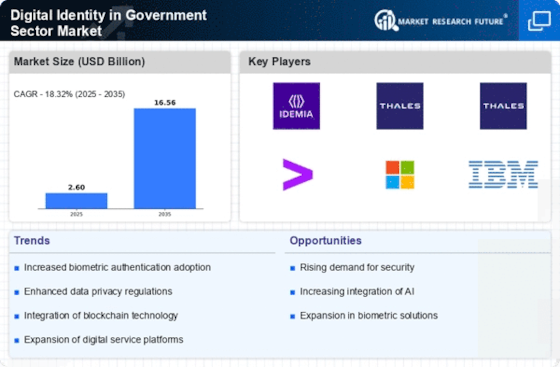Market Analysis
In-depth Analysis of Digital Identity in Government Sector Market Industry Landscape
There is a notable growth in the Digital Identity in the Government Sector market. Its growth has been influenced by different factors that meet public administration, security and service delivery requirements as they change. The key driver is the increasing demand for secured and efficient government services. Governments across the world are seeking to digitalize interactions with citizens starting from accessing public services and ending at elections. This is where Digital Identity solutions come in, providing both secure and convenient identification means, capable of ensuring data integrity and privacy when people are trying to get on-line governmental resources.
Another crucial factor driving adoption of Digital Identity solutions in the government sector is imperative for enhanced national security and border control. Governments are investing in advanced identity management systems to strengthen border security, prevent identity fraud, and monitor the movement of individuals across borders. Biometric authentication, facial recognition, together with secure credentialing constitute an integral part of Digital Identity solutions assisting with effective border control and national security measures.
The global trend toward e-governance and digital transformation has significantly impacted the Digital Identity in Government Sector market. Governments have increasingly resorted to online platforms for delivering service, interacting with citizens or simplifying administrative procedures among others. It enables access to these e-governance platforms through secure Digital Identity solutions that reliably verify citizen’s identities while they interact with government services, submit official documents or participate in digital voting processes.
This makes such their use essential especially because governments still experience cases of identity thefts, tracking the progressiveness about fraudulent benefit claims as well as unauthorized accessing into sensitive information. Henceforth the employment of digital methods such as Biometric verification including multifactor authentication which helps provide strong mechanisms for verifying properly identified individuals who are its own citizens securely thereby contributing proactively towards fighting against fraud cases so that it does not occur by all means possible thus maintaining integrity within programs or services provided by its government.
In addition, the demand for streamlined and transparent governance processes is driving the growth of digital identity solutions. Citizens want to access government services in a more convenient manner and they expect that such services will be responsive and transparent. Digital Identity solutions help streamline administrative processes, reduce paperwork, and make it possible for citizens to engage securely online. This way, efficiency obtained herein also improves overall citizen experience while trust within provision of government services being created thereby promoting participation as well as satisfaction among citizens.
Also, the increasing focus on data privacy and compliance is shaping the dynamics of Digital Identity in Government Sector. Governments are passing regulations aimed at safeguarding personal data through protecting citizen privacy that has to be respected when being used responsibly. As far as abiding by the laws is concerned, Digital Identity Solutions play an important role through incorporating privacy-preserving technologies, secure data storage practices and transparent consent mechanisms. Therefore governments introducing or adopting these solutions are better placed to maintain their data protection standards thus building confidence with their citizens about how responsibly they can use their information.
Lastly the response to global health crises such as Covid-19 pandemic has accelerated adoption of digital identity solutions in this sector. Contactless interactions, secure online services and digital health initiatives were essential during COVID-19. During this time Digital Identity solutions ensured that people could authenticate themselves from a distance without face-to-face interaction with them; helped gain secure entrance into governmental resources and supported the implementation of online health documents which are digital health passports thus meeting changeable needs of public authorities as well as communities during outbreaks like pandemic ones.
Cost also has a major influence on the adoption of Digital Identity for government sector. Government must take into account costs in evaluating identity management systems as the cost-effective implementation and maintenance has become an important factor. To this end, digital identity providers offer scalable and customizable solutions that enable governments to choose among various offerings within their budget constraints but addressing public sector specific security and compliance requirements.


















Leave a Comment